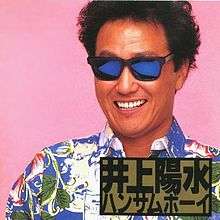Handsome Boy (album)
| Handsome Boy | ||||
|---|---|---|---|---|
 | ||||
| Studio album by Yōsui Inoue | ||||
| Released | October 21, 1990 | |||
| Genre | Folk rock | |||
| Length | 47:31 | |||
| Label | For Life | |||
| Producer | Yōsui Inoue | |||
| Yōsui Inoue chronology | ||||
| ||||
Handsome Boy is the 14th studio album by a Japanese singer-songwriter Yōsui Inoue, released in 1990.
The album contains the songs that were already known through the commercial tie-in with television programs or advertisements. Like "Gallery" which was recorded by Yoko Oginome and released as a single in June 1990, some of the materials were previously interpreted by other performers.[1]
Prior to the album, three songs were released as a single; "Yume Ne Mi", "Saigo no News", and "Shounen Jidai" which was co-written by Natsumi Hirai and has been one of his most well-known songs throughout Inoue's longtime career. It was initially featured on the theme song for an award-winning film adaptation of Fujiko Fujio (A)'s manga Childhood Days (based on Hyouzou Kashiwabara's novel Nagai Michi).[2] The song was gradually recognized through the TV ad of Sony Handycam which was aired during the following year. "Shounen Jidai" became his biggest hit single, peaking at #4 on the Japanese chart and selling more than 850,000 copies in total. In 1997, 3-inch CD single of the song was certified quadruple platinum by the Recording Industry Association of Japan, for shipments of over 1 million copies. [3]
Led by the success of a single "Shounen Jidai", the album Handsome Boy itself also gained favorable reaction, peaking at #2 on the Japanese Oricon chart and entering top-100 for over 10 months with sales of about 640,000 copies.
Track listing
All songs written and composed by Yōsui Inoue, unless otherwise noted
- "Pi Po Pa" - 3:55
- "Emily (エミリー Emirī)" - 3:35
- "Rival (ライバル Raibaru)" (Inoue, Yūji Kawashima) - 3:51
- "Saigo no News (最後のニュース)" - 3:55
- "Gallery (ギャラリー Gyararī)" - 5:07
- "Shounen Jidai (少年時代)" (Inoue, Natsumi Hirai) - 3:21
- "Fiction (フィクション Fikushon)" - 3:21
- "Tokyo" (Inoue, Hirai) - 3:56
- "Yume Ne Mi (夢寝見)" - 5:03
- "Shizen ni Kazararete (自然に飾られて)" (Inoue, Hirai) - 6:07
- "Choujikan no Hikou (長時間の飛行)" (Inoue, Kawashima) - 4:22
Personnel
- Yōsui Inoue - Vocals, acoustic guitar
- Hiromi Yasuda - Acoustic guitar
- Kenji Ōmura - Electric guitar
- Tomotaka Imamichi - Electric guitar
- Jun Sumida - Electric guitar
- Masaki Matsubara - Electric guitar
- Masayoshi Furukawa - Gut-string guitar
- Hirokazu Ogura - Gut-string guitar
- Masami Satou - Gut-string guitar
- Tsugutoshi Goto - Bass guitar
- Motofumi Hagiwara - Bass guitar
- Chiharu Mikuzuki - Bass guitar
- Vagabond Suzuki - Bass guitar
- Haruomi Hosono - Bass guitar, synthesizer, percussion
- Tadashi Nanba - Synthesizer
- Akira Inoue - Synthesizer
- Miharu Koshi - Synthesizer
- Akira Senju - Synthesizer
- Shinji Kawahara - Piano
- Takao Kisugi - Piano
- Yasuharu Nakanishi - Piano
- Yūji Kawashima - Synthesizer, computer programming
- Takeshi Fujii - Computer programming
- Hiroaki Sugawara - Computer programming
- Nobuo Tsuji - Computer programming
- Ma*to - Computer programming
- Yasuo Kimoto - Computer programming
- Motoya Hamaguchi - Percussion
- Eiji Narushima - Percussion
- Masato Hashida - Percussion
- Makoto Kimura - Percussion
- Hinotamao - Percussion
- Hideo Yamaki - Drums
- Eiji Shimamura - Drums
- Yutaka Odawara - Drums
- Junichi Kazezaki - Brasswinds
- Shin Kazuhara - Brasswinds
- Kenichirou Hayashi - Brasswinds
- Masahiro Kobayashi - Brasswinds
- Kenji Nakazawa - Brasswinds
- Kenji Nishiyama - Brasswinds
- Taro Kiyooka - Brasswinds
- Sumiyo Okada - Brasswinds
- Watanabe Katsu - Brasswinds
- Teiko Haruna - Woodwinds
- Mitsuru Souma - Woodwinds
- Ryūji Hoshikawa - Woodwinds
- Tadashi Togame - Woodwinds
- Masakazu Ishibashi - Woodwinds
- Toshitsugu Inoue - Woodwinds
- Jake H. Conception - Woodwinds
- Hirofumi Kinjou - Woodwinds
- Masaki Takano - Woodwinds
- Hiroyuki Ichihara - Woodwinds
- Hidefumi Toki - Woodwinds
- Aska Kaneko Strings - Strings
- Akiko Yano - Chorus
- Minako Yoshida - Chorus
- Seri Ishikawa - Chorus
Chart positions
Album
| Album | Chart | Position | Weeks | Sales |
|---|---|---|---|---|
| Handsome Boy | Japanese Oricon Weekly Albums Chart (top 100) | 2[4] | 44 | 639,000+ |
Singles
| Single | B-Side | Chart | Position | Weeks | Sales |
|---|---|---|---|---|---|
| "Yume Ne Mi" | "Beni Suberi" | Japanese Oricon Weekly (top 100)[5] | 37 | 6 | 23,000 |
| "Saigo no News" | "Back Side" | 57 | 6 | 16,000 | |
| "Shounen Jidai" | "Ara-Washi no Uta" | 4 | 38 | 853,000 | |
Release history
| Country | Date | Label | Format | Catalog number | Notes |
|---|---|---|---|---|---|
| Japan | October 20, 1990 | For Life Records | CD | FLCF-30081 | |
| Audio cassette | FLTF-26021 | ||||
| May 30, 2001 | CD | FLCF-3858 | Original recording digital remastered | ||
| March 25, 2009 | For Life Music Entertainment/BMG | SHM-CD | FLCF-5011 |
References
- ↑ 荻野目洋子 Official Website "single / discography" Check
|url=value (help). oginome.com (in Japanese). Retrieved 2009-06-15. - ↑ 映画 少年時代 - "allcinema (Movie & DVD Database) - the motion picture Childhood Days" Check
|url=value (help) (in Japanese). Retrieved 2009-05-11. - ↑ RIAJ Certified Million Seller Singles "List of the singles certified "Million" by the Recording Industry Association of Japan (1989-2009)" Check
|url=value (help) (in Japanese). Retrieved 2009-06-15. - ↑ "Yamachan Land (Archives of the Japanese record charts) - Albums Chart Daijiten - Yosui Inoue" (in Japanese). Retrieved 2009-04-24.
- ↑ "Yamachan Land (Archives of the Japanese record charts) - Singles Chart Daijiten - Yosui Inoue" (in Japanese). Retrieved 2009-04-24.